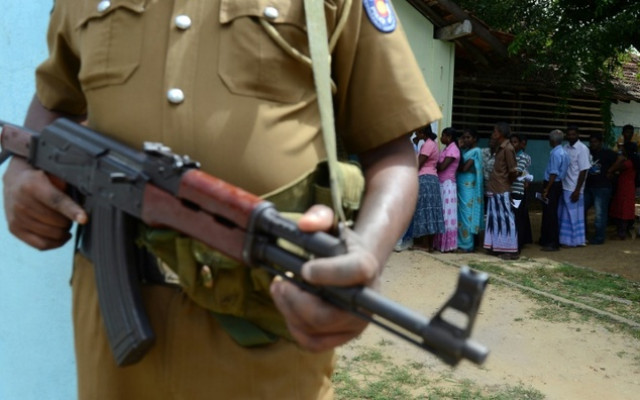Sri Lanka calls in troops to battle gangs
President says he ordered security forces to conduct joint operations with police to dismantle crime networks

PHOTO: AFP
President Maithripala Sirisena told a public meeting in Colombo that he ordered security forces to conduct joint operations with the police to dismantle crime networks responsible for a spate of shootings in Colombo and its suburbs.
"I have instructed the army and the police to jointly take all measures legally possible to crackdown on underworld gangs," Sirisena said. "We can't allow these criminals to disrupt the normal life of the community."
Sri Lanka thanks Pakistan for help in wiping out terror
Earlier in the day, the police said more than 100 of their stations in Colombo and suburbs had been asked to erect snap blocks, a common practice during the island's separatist war that ended nearly seven years ago.
Police spokesperson Ruwan Gunasekera said there was a surge in drug smuggling and shootings that prompted the authorities to take extraordinary measures.
"The objective is to prevent serious crime and drug smuggling as well as to catch those committing serious crime," he said.
At least three people were shot dead and many more wounded in Colombo in the past week in what police said was gang-related violence.
Unidentified gunmen had opened fire on a prison bus and wounded a suspect who was being taken back to jail after a court hearing in the capital last week.
Another suspect on bail was shot dead at home while a woman was shot and wounded outside the main prison in Colombo Saturday after she visited her jailed husband.
Gunasekera said 10 special units were also established to target gang activity that had increased in recent weeks.
Sri Lankan authorities had dismantled road blocks and stopped vehicle checks after the end of the decades-long Tamil separatist war in May 2009.
Even the permanent check points at key entry points to the city had been removed several years ago.
The new government which came to power in January last year removed the last remaining check point at the entrance to the former war zone as a sign of normality.
However, the new police measure brought back memories of war-time Colombo when freedom of movement was curtailed due to frequent stops for security checks.
At least 100,000 people were killed in the 37-year war which ended after a major offensive by the military.





1725099588-0/BeFunky-(41)1725099588-0-208x130.webp)













COMMENTS
Comments are moderated and generally will be posted if they are on-topic and not abusive.
For more information, please see our Comments FAQ